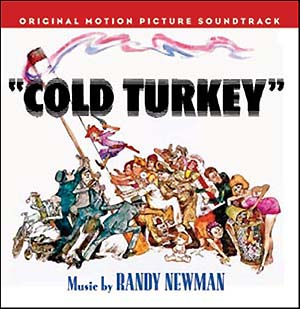
“What are those words at the end?” one of my daughters recently asked me. I could answer the question perfunctorily and explain union obligations. But let’s look at it more philosophically. The end credits roll provides an opportunity for filmmakers to leave audiences with one final thought, often presented in music, more specifically, generally pop or original scoring.
For the viewer, it provides a moment of brief contemplation to consider what has just been screened. I’ve probably spent months of my life in this state of contemplation during end credits. More often than not what end credit choices have some level of narrative/character relevance, but are not especially interesting. What can you really do with that space, right? But there have been incidents when end credits have quite possibly blown my mind, shoving me out of the theater mouth agape, eyes wide open, invigorated.
The following are three films that truly re-defined what can be done during the end credits.
Cold Turkey (1971, USA), the story of a town that gives up smoking to obtain $25 million from a tobacco giant is a scathing satire. Like Robert Altman’s Nashville, the film is just as relevant today in our American Idol society. Both say a lot about our culture, and it isn’t confirming that America’s Got Talent. Randy Newman, in his first foray into film music, follows the film’s final irony, the billowing factory smokestacks erected with the prize money, with “He Gives Us All His Love” against the backdrop of a dog rummaging through ruins. While contrasting the chaotic, broad style of the film, Newman’s song retains the irony while being simplistic and melancholic. A pitch-perfect move to land the movie’s message in your gut.
Penn and Teller Get Killed (1989, USA), the magician-comic duo’s entry into feature films, was never widely released. As dry and dark as comedy gets, the film is unremarkable until its final sequence when a running gag of escalating practical jokes ends tragically and initiates a serial body count. The ending is stunning, funny and disturbing. Then the film fades to credits over the strains of The Bee Gees’ “I Started a Joke,” a choice that perfectly captures the film while still one last unexpected charge of tragicomic shock. After years of being unavailable, the film was recently released as a Warner Archive selection, available only through the distributor.
Little Sister (1995, Netherlands), an obscure gem, follows a young man who ends his estrangement with his sister and addressing an incestuous incident from their past. The encounter is documented by the brother and, pre-Blair Witch, the film is shot entirely through the POV of a video camera within the narrative. While most movies use exit music to sum up the story (see any Ice Cube credit jam) or themes (the end credits of 8 Mile and The Wrestler practically made the movies themselves irrelevant to me), Little Sister offers an odd ode to youth. It was so unexpected and fresh to hear the Sesame Street song, “Somebody Come and Play,” artist identified on the original 45 as simply The Kids, over this film’s end credits. The song and movie are contemplating, both somehow adding depth to the other. Remains only available as a VHS from Facets Video.
–Pops Corn
